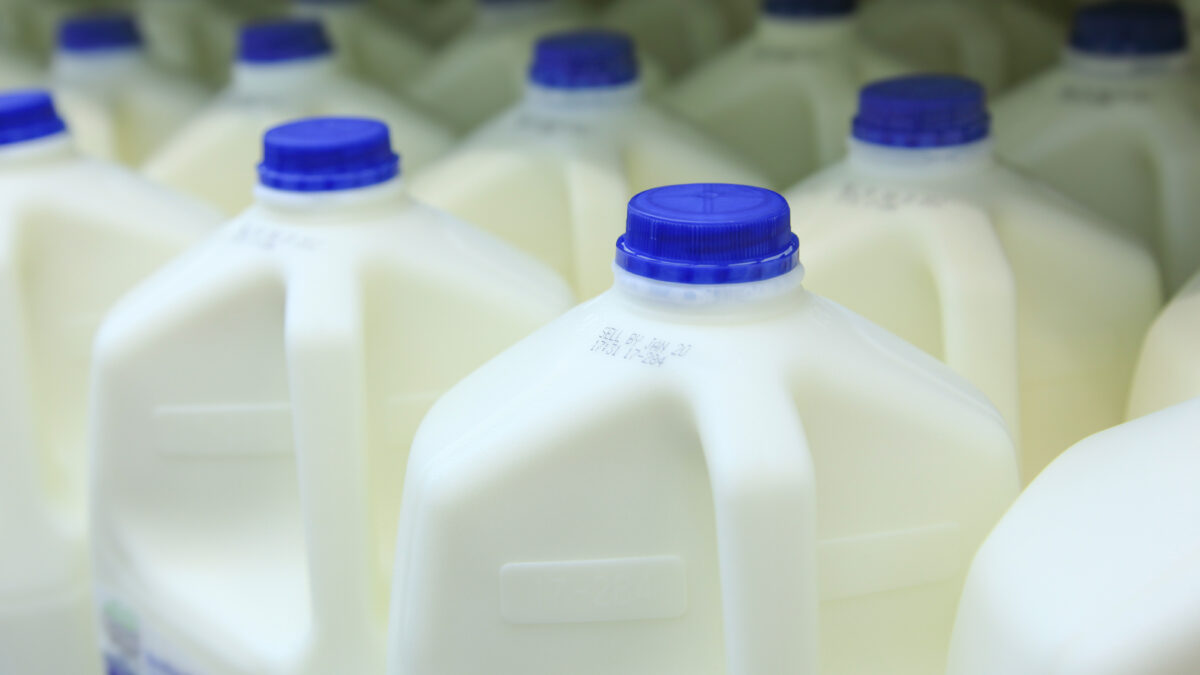An Open Letter to Consumers About Milk
TOPICS
Covid-19Guest Author
Special Contributor to FB.org

photo credit: Getty
Guest Author
Special Contributor to FB.org
By Sarah Hetke @WIFarmBureau
Have you been to the grocery store lately only to find many of the shelves and coolers picked over? Maybe you went in for a loaf of bread or a couple gallons of milk, but had a hard time finding either.
Every week, my grocery list has a few staples, one of which is milk. And every week when I go to the grocery store, I am blessed with coolers filled with of milk in different flavors, sizes, brands, etc. That was up until COVID-19 started making the headlines.
Dairy industry representatives, including Farm Bureau, have been very vocal about asking stores to remove dairy product limits because the supply chain backlog is a temporary challenge.
Lately, I go to the store and I see a more limited selection of many items, including milk. My milk choice is pretty standard, a gallon or two of 2% white milk, so I’m usually able to find what I’m looking for. I am sure I’m not alone in the alarm I felt when I started noticing signs asking patrons to limit the quantities of milk they were purchasing. Some went so far as to specify the number of gallons allowed.
I then started seeing stories of dairy farmers being asked, by their creamery, to dispose of their milk. This is good quality milk that is literally being dumped down the drain.
This all started to get very confusing, very fast.
Turns out that with more and more states encouraging residents to stay at home and limiting dining options, dairy products aren’t moving through the supply chain like normal.
Almost overnight, the large foodservice sector demand for cheese dropped dramatically, while the demand for milk skyrocketed. This led to some complications in getting the right products made in the right quantities in a relatively short amount of time.
To put this into perspective, the Wisconsin Cheesemakers say that 50% of cheese produced in the U.S. goes directly to foodservice or to companies that prepare cheese products for foodservice. With restaurants, schools and sports arenas closing or offering limited options, this has put a strain on dairy processing.
Wisconsin is known for cheese and we have a lot of creameries that buy milk to make cheese. It is nearly impossible to quickly turn a cheese making plant into one that bottles milk. You can see where this leads to some strain on the supply chain.
Dairy industry representatives, including Farm Bureau, have been very vocal about asking stores to remove dairy product limits because the supply chain backlog is a temporary challenge. Dairy supporters on the local, state and national level are stepping up and talking about solutions, asking for action and encouraging everyone to chip in.
The cows are still making milk and dairy farmers are working every day to bring that milk to our grocery stores and ultimately the dinner table.
Any shortages you see will only be temporary. The quick swing in consumers’ dairy product preference will continue to be a challenge, but there will always be more milk, cheese, yogurt and other dairy products made daily.
While it can be frustrating to go to the store and not have the same selection we’re used to seeing, farmers are equally frustrated that there is no market for some of the best quality milk in the world and that overall market prices are fluctuating dramatically.
So what can you do to help? Easy, buy more dairy products. Maybe you buy an extra gallon of milk or make a homemade pizza loaded with cheese.
Maybe you can make a monetary donation to your local food pantry specifically ear marked to purchase dairy products.
Just as our farmers need our support, our community members who have lost their jobs need it as well. More people are relying on food pantries, so even the smallest donation can make an impact.
I have heard of some heartwarming stories of individuals, groups and local businesses stepping up to donate cheese curds, milk or other dairy products to a local food pantry. This is a win-win-win for farmers, local businesses and members of the community who rely on the food pantries.
So as you find yourself at the grocery store, listening to the news or browsing social media wondering why the milk case isn’t as full as normal, remember our dairy farmers, creameries and transportation workers who are working hard to help us through these challenging times.
Join me in raising a cold glass of fresh milk as you gather around the dinner table to show your appreciation for our nation’s hardworking farmers.
Sarah Hetke is Wisconsin Farm Bureau’s director of communications. This column was originally published as a WFB blog post.
Trending Topics
VIEW ALL